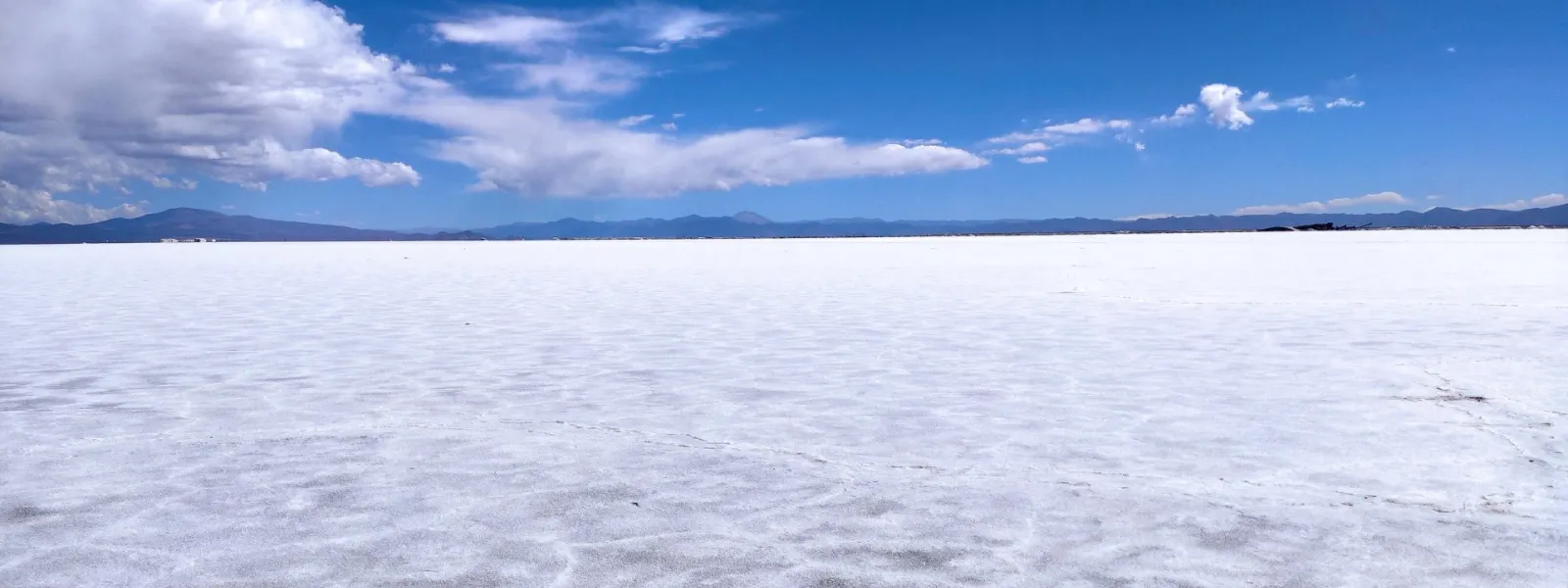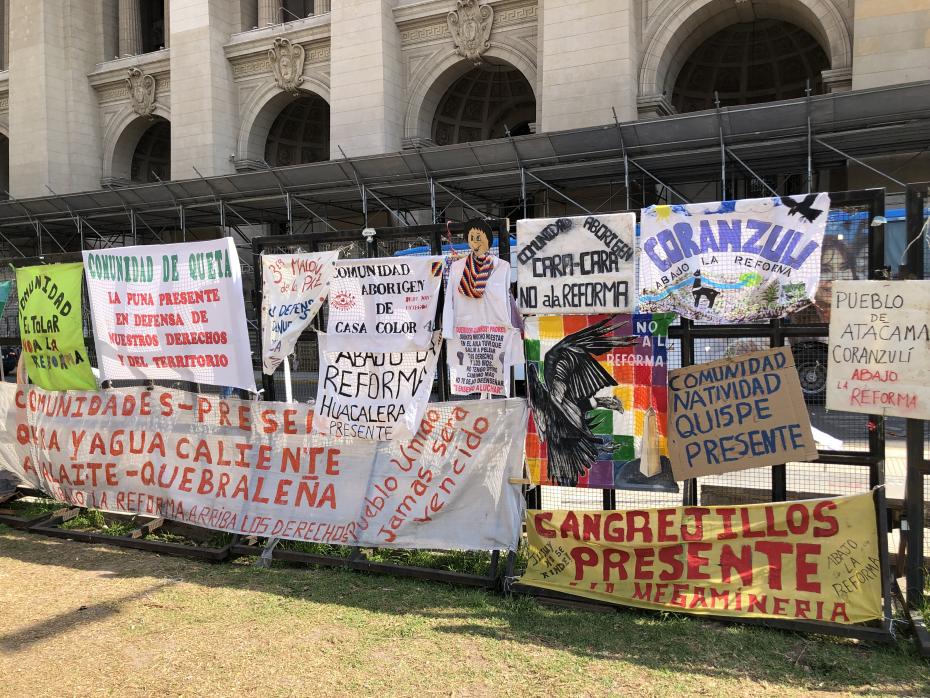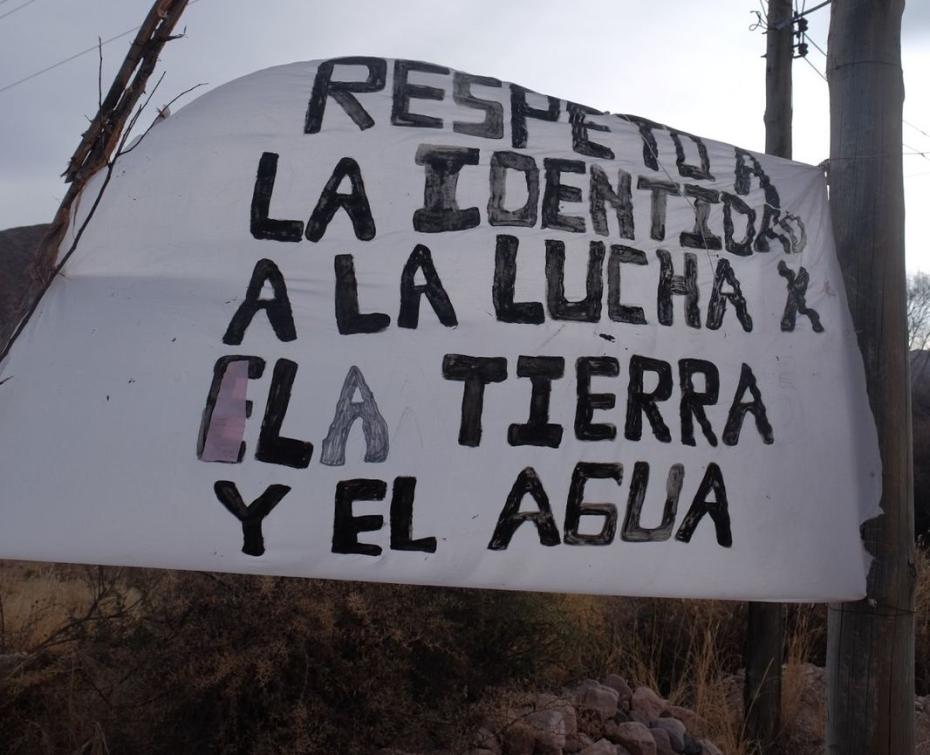
"Water is worth more than lithium": Resistance against an unjust energy transition
Photo: CALMA Cine"Water is worth more than lithium" is the slogan under which social organizations, trade unions and indigenous peoples have been expressing their resistance against the constitutional reform in Jujuy, a province in northern Argentina.
They claim that this reform, promoted by Governor Gerardo Morales, doesn’t respect international regulations on the rights of indigenous peoples, including Convention 169 of the International Labor Organization (ILO), which establishes the right to free, prior and informed consultation of peoples on projects to be developed in their ancestral territories. In this sense, this reform would have been approved on June 16, in a short process that didn’t allow for broad public participation and deliberation and in which there was no proper consultation with indigenous peoples.
Furthermore, the constitutional text represents a significant step backwards on environmental and human rights issues; it also opens the doors to mega-mining -including lithium mining- under the guise of energy transition, criminalizes protests and allows the privatization of both water and indigenous lands. Indigenous communities have claimed that the indiscriminate advancement of lithium mining projects in the province will exacerbate the water crisis currently affecting the area.
With increasing international demand for lithium - considered a strategic resource due to its energy storage capacity (useful for the battery and electric vehicle industries) - global mining and production has accelerated in recent years, with a focus on regions rich in the mineral, such as the Andean salt flats of Argentina, Bolivia and Chile, where more than 53% of the world's proven reserves are located.
Lithium is found in brines, pegmatites and sedimentary rocks, although it’s easier to from the former. However, extraction requires large quantities of water and takes place in fragile ecosystems such as salt flats, which suffer from water-deficiency and are severely affected by the impacts of the climate crisis.
The social resistance to the constitutional reform in Jujuy is also a resistance to a global trend that, in the name of an energy transition that is far from being just, seeks to perpetuate extractivist models that violate human rights.
Human rights violations in Jujuy
AIDA - along with seven other civil society organizations with extensive experience in environmental and human rights defense - was part of an international mission that visited Jujuy from 21 to 25 August to learn first-hand about possible violations of the right to protest and participation in the context of the constitutional reform.

The mission visited the main protest centers and documented testimonies from people from indigenous groups and communities, farmers' associations, trade unions and human rights organizations, as well as social leaders, teachers, lawyers and provincial authorities. Preliminary conclusions indicate that:
- Even when indigenous peoples and their communities demanded participation in the constitutional reform, it was carried out without an exhaustive deliberative process.
- Despite climate crisis and water scarcity, the reform doesn’t properly address integrated basin management and ecosystems conservation.
- The reform seems to favor large-scale industrial, agricultural and livestock use of water resources and opens the doors to concessions that can lead the privatization of water, damaging ecosystem cycles and failing to protect small-scale agriculture and livestock, vital to the existence of native communities.
- There is a repeated and manifest concern from indigenous communities about the negative impacts of mining, particularly lithium extraction projects.
- Testimonies report cases of repression of social protest, arbitrary arrests, harassment and alleged torture by the police of people involved in resistance, as well as disproportionate use of force.
The mission is currently systematizing the information collected in order to prepare recommendations oriented that will highlight the complex situation in the province of Jujuy and contribute to a dialog that will allow for a better resolution of the social conflict and respect for human rights.
What kind of transition does the constitutional reform in Jujuy point to?
Addressing this question is important to understand that a just energy transition is incompatible with a context in which private economic interests prevail over social and environmental considerations, and in which government actions ignore the impacts of lithium extraction and the legitimate claims of local communities to manage their water and territory.

Jujuy is home to over 12 indigenous peoples and around 400 communities -whose members have dedicated for millennia to salt extraction in Salinas Grandes, the fourth largest salt flat in South America. Their connection to water is sacred and ancient. It’s a cultural connection that is threatened by the exploitation of lithium, which jeopardizes the availability of an extremely scarce resource.
"To extract one ton of lithium (through evaporation), 2 million liters of water are evaporated from the wells, that is, 2000 tons of water that cannot be re-circulated," says Ingrid Garcés, professor in the Department of Chemical Engineering and Mineral Processes at the University of Antofagasta, Chile. This "is profitable for the industry because it means a process without energy costs, but unfortunately it has the cost of losing water from a system that is not renewable, especially in a desert region" (like the salt flats).
The constitutional reform in Jujuy doesn’t stipulate an order of priority for water use, but puts human and industrial consumption on the same level. Limited access to water is a central concern in the province, as there are few groundwater resources to meet the demand for water for human and domestic use, as well as for small-scale agricultural and livestock production.
An urgent change of course
The water crisis is one of the most pressing crises worldwide and is intrinsically linked to the climate crisis and the need to switch to alternative energy production. Extreme weather patterns - such as prolonged droughts, floods and more intense storms – have a direct impact on the availability and distribution of water in different regions of the world, leading to a decline in water resources.
In this scenario, competition for water use intensifies and requires social water management for the benefit of communities. This is the only way to address the situation in terms of sustainability and environmental justice.
The extraction of lithium to satisfy corporate interests is an example of the paradox that tackling the climate crisis comes at the expense of communities and ecosystems. The lack of fair and equitable distribution of benefits and the externalization of environmental and social costs underscores the urgency to rethink and radically transform our relationship with natural resources and the way we address the climate crisis.
Vania Albarracín Silva

Vania Albarracín Silva is Bolivian and a junior attorney with AIDA's Territories Program, working from La Paz, Bolivia. She is a lawyer from the Universidad Privada Boliviana and a sociology student at the Universidad Mayor de San Simón (Cochabamba, Bolivia). She holds a diploma in Sustainability and Social Justice from the Latin American Council of Social Sciences (CLACSO). Vania has experience working with social organizations in defense of the environment and territory.
